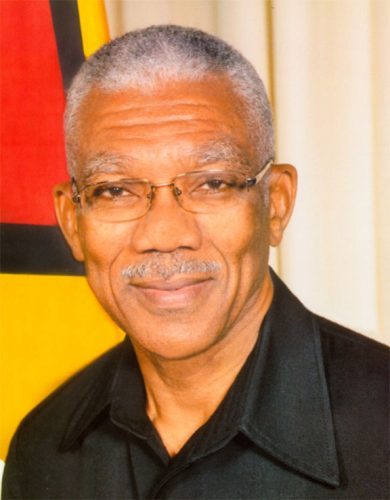President David Granger has announced that he will resist any attempt to deny him input in the list of six “not unacceptable” candidates for consideration for the post of chairperson of the Guyana Elections Commission (GECOM).
Speaking on interview programme The Public Interest, which has been on hiatus for two years, Granger said Opposition Leader Bharrat Jagdeo’s outright rejection of his suggestions is “a recipe for gridlock.”
On Wednesday, Jagdeo rejected Granger’s suggestion of retired judge Claudette La Bennett and GPHC Chairperson Kesaundra Alves for addition to the list of four persons already deemed “not unacceptable.” Jagdeo then submitted four additional names.
“I’m not a passive participant; not an observer but an active participant…There must be a spirit of compromise. There must be acceptance of the role of the president in hammering out the list…there is no way the removal of the president’s role can result in an outcome that is consensual,” Granger repeatedly emphasised in response to questions from Deputy Director of the Press and Publicity Unit of the Ministry of the Presidency, Ariana Gordon.
He stressed that he could not sit and wait for a list since that process failed the last time and forced him to rely on the provision in the Constitution which empowered him to make an appointment.
Article 161(2) of the Constitution, which provides for the appointment of the GECOM Chairperson, says the office holder is to be appointed by the President from a list of six persons, not unacceptable to the President, submitted by the Leader of the Oppo-sition after meaningful consultation with the non-governmental political parties represented in the National Assembly.
Granger also repeatedly referenced the ruling from the Caribbean Court of Justice (CCJ) on the selection of a GECOM chair, stressing that the court did not say that the President “may” have a role but that he “must” have a role in the process of hammering out a list. “The CCJ made it clear that it was not altering but interpreting the Constitution…moving away from unilateralism towards consensualism. The president has a role…the process will be faster and both sides will be happier,” he contended.
In its ruling, the CCJ that the most sensible approach to formulating a list before one is submitted was for the Leader of the Opposition and the President to communicate with each other in good faith on, and possibly even meet to discuss eligible candidates for the position of Chairman. It said, “The aim of these discussions must be to agree the names of six persons who fit the stated eligibility requirements and who are not unacceptable to the President. In this regard, the Constitution anticipates that the Leader of the Opposition and the President will conduct themselves in a reasonable and responsible manner, eschew partisanship and seek the best interests of the Republic and the Guyanese people.”
It adds, “Once the President and the Leader of the Opposition have hammered out a list of names not unacceptable to the President, the list, comprising the six persons, must then formally be submitted to the President by the Leader of the Opposition and the President must then select the Chairman from among those names. This approach gives the President a role in the identification of the six names, but it obviates the possibility that, after the formal presentation of the list, the President could suggest that one or more of the names, or indeed the entire list, is ‘unacceptable.’”
The president argued yesterday that by engaging with the opposition a total of six times since July 4th, he and his government have “complied completely with the ruling of the court…and with the consequential orders.”
He argued that it is misleading to claim that his government was attempting to delay the process and acting in bad faith.
According to Granger, it is only GECOM which can conduct elections and therefore he will await the advice of the commission on the best date for elections.
He further noted that in the absence of a chair, the commission cannot function and explained that he is committed to engaging in the process to appoint one as soon as possible so that credible elections can be held in the swiftest possible time.
The president also maintained that in conducting house-to-house registration, which begins today, GECOM is not acting on his directives and said that his government will not breach any of the internationally established conventions which guide interim governments.





